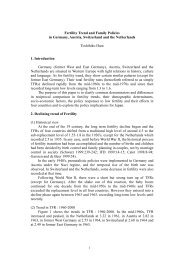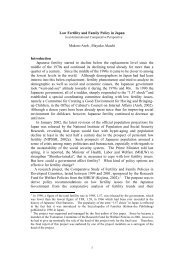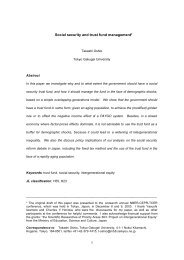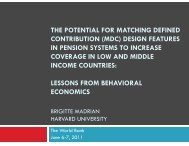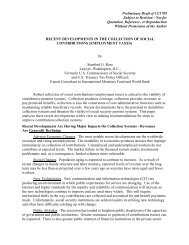Intergenerational Voter Preference Survey - Preliminary Results ...
Intergenerational Voter Preference Survey - Preliminary Results ...
Intergenerational Voter Preference Survey - Preliminary Results ...
Create successful ePaper yourself
Turn your PDF publications into a flip-book with our unique Google optimized e-Paper software.
Longterm care -0.333 -1.25Education -0.229 -1.01Science & technology -0.62 -1.33Childrearing support 0.632** -3.02Environment -0.470* -2.03Eenergy -0.0872 -0.37Foreign affairs -0.218 -0.89Employment -0.119 -0.54Security (safety) -0.314 -1.3Constant 0.619 1.44Table 24: Party change since last general electionA voter is more likely to have switched party since the last election if he or she thinkschildrearing is important. This is more likely for younger females. One the mostprominent changes in policy after the general election was cash payment for familieswith young children. Regression suggests this effected young women, who could bemothers or could be mother in the future, that cared about childrearing support.8. ConclusionIn this paper we have presented results of a survey conduction in December 2011, inorder to see if introduction of Demeny voting system will have the desired have effectof addressing gerentocracy. We have identified several facts from the survey thatprovides a positive answer to this question.We found that there is substantial difference of policy preference between voters withyoung children and those without, either because they have only older children or theyhave not children. Among voters with young children, childrearing is very importantwhile pension is important among other voters. (The largest proportion in bothgroups think employment is the most important.). Furthermore, voters with youngchildren thought education was is most important for their children. This suggests,parents in deed are aware that their children’s needs are different form their own.When proxy votes (children’s votes) and their policy preferences are taken intoacocount, the Demeny Voting Block ( voters with children + children)’s policypreferences of childrearing and education (employment is not as important) is differentfrom non-Demeny Voting Block for whom pension and employment are priorities,28



